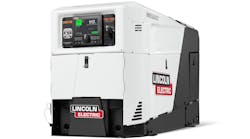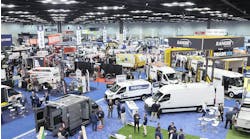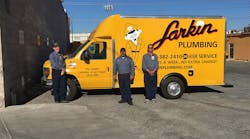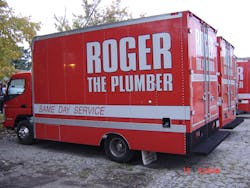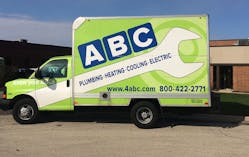DO CONTRACTORS like full-size commercial vans, Euro-style vans or box trucks? Yes. Do they like Chevy, Ford, Ram, Mitsubishi-Fuso? Yes. Each of the plumbing contractors we talked to had their own preference for the trucks they run and why those trucks are the best choice for them.
One contractor likes diesels, another one doesn’t. One contractor wants a big truck to carry fixtures and water heaters, another one doesn’t. One contractor worries about gas mileage but another doesn’t.
In Las Vegas, Mark Larkin, Larkin Plumbing & Heating, uses four different trucks but mainly uses a Ford E-Series Cutaway van topped with a Spartan Cargo Body by Supreme Corp. He had used the Workhorse van — the big boxes that look like a UPS truck — based on a ¾- or 1-ton Chevrolet truck chassis, a few Ford Econoline cargo vans, Chevy pickups and one dump truck. Any of them can tow his jetter. Larkin has settled on the E-Series Cutaway because it was considerably less expensive and it’s much easier to cool the cab, a major issue with any plumber in Las Vegas in summer, Larkin points out. He runs a half dozen Chevy pickups for helpers/laborers and parts delivery. He has more than two dozen trucks in his fleet.
Larkin orders them with a 6.2 liter V8. He’s had some V6s and didn’t better gas mileage. The trucks get about 10.75-11.25 mpg, fully loaded and 90% street driven. Some of the vehicles will carry water heaters but not fixtures, and Larkin notes that the gross vehicle weight is about 8,700-9,200-lbs., well under the rated 9,999-lbs GVW.
He prefers to buy them with single rear wheels, although he has a couple duallies, but only because that’s the way the truck came when they needed to buy them. The Spartan bodies are 10.5-ft. to 12-ft. long with stand-up height inside. Lack of stand-up height is one reason why he’s phasing out his Econoline vans, as well as their being harder to cool.
He is not a fan of Euro-style vans for a number of reasons. They’re higher off the ground so the plumber has to step up higher to get into them. All of them are duallies, which to Larkin just means more tires to replace. They have a higher GVW of around 12,000-13,000-lbs., and Larkin doesn’t need that. And most of them are diesel. Larkin has heard he can get as much as 300,000 miles out of a diesel, but he’s getting 150,000-180,000 miles out of his gas trucks, although he might have to replace the transmission once. Larkin Plumbing & Heating puts 14,000-16,500 miles per year on a truck. Moreover, while the diesel engine may get 300,000 miles, the rest of the vehicle looks like a truck with 300,000 miles on it, he points out, and that’s not the image he wants for his company.
He owns one Ram ProMaster that’s held up well but it doesn’t get any better gas mileage than the Cutaways. Larkin reports that he “got a huge deal on it” with 1,200 miles on the odometer. His main reservation with the ProMaster is that it’s front wheel drive and if he has to replace the transmission, it’s $4,000-$5,000 instead of $1,500 on the Ford E-Series.
It’s all in the truck
Roger Peugeot, who recently sold his namesake Roger The Plumber, Lenexa, Kansas, made his big, red box trucks the focal point of his advertising and marketing with the slogan “It’s All in the Truck!” Some plumbers may be fast and some slower, Peugeot says, but none of them wants to run to a supply house in the middle of a job to get parts. Peugeot’s plumbers could sell $5,000 in fixtures and materials in a day because of the enormous stock on the trucks.
Peugeot bought Mitsubishi Fuso chassis cabs and outfitted them with custom boxes made by Brown Cargo Van in Lawrence, Kansas. Brown also upfitted the boxes with lightweight shelving and Peugeot stocked them with plastic boxes that are numbered, bar coded and labeled to hold all the materials. There’s so much material in the trucks that Peugeot also wrote a book for his people that says what parts are in what numbered box.
The trucks carry a 40-gallon and 50-gallon water heater; an ADA and an elongated toilet; built in chargers for battery-operated tools; Delta Faucets with a variety of handle options; pipe up to 2-inches; and ball valves from ¼-2-inches. Peugeot said they had an emergency repair at Yellow Freight at 2:00 AM and they had the 2-inch ball valve that was needed on the truck.
Peugeot also relies on his knowledge of his customers to stock the trucks — he knows what’s behind the wall in those houses so he knew what he needed to stock.
Peugeot says his “It’s All in the Truck!” ad campaign on radio and in print was the best advertising he’s run in his career. The campaign features one of the trucks, Peugeot, and all of the truck stock spread out in front. One time he rented two spaces in a home show and used the extra room to display his entire truck stock. That led to numerous show-goers complaining about plumbers who showed up without the necessary tools and parts who had to leave in the middle of a job.
Peugeot says his ‘It’s All in the Truck!’ ad campaign on radio and in print was the best advertising he’s run in his career.
“All plumbers are going to get complaints on what they charge, but if you provide convenience to the customer and charge them for it, people appreciate that we have everything on the truck when we show up,” he says. “And if we don’t have it, we’ll have it delivered to the house.”
The Mitsubishi Fusos are diesel, Peugeot says, and they have to be inspected by the Kansas Department of Transportation. He maintains that having a fully stocked truck is more important than fuel efficiency. He got 250,000 miles out of one truck, then took the custom box off of it and mounted it on another truck. He’s approaching 100,000-150,000 miles on his second set of diesel trucks and has few problems with them. He notes that he recently had to replace the brakes on one truck but it had 100,000 miles on it.
All Chevys
In Highland Park, a northern suburb of Chicago, Tom Mahoney, Little Tommy's Plumbing Shop, Inc., runs 10 trucks, nine Chevy Express 1500 commercial vans and one Ram ProMaster. Mahoney, who started Little Tommy’s in 2009, is a traditionalist who runs the cargo vans because that’s what his dad used when he started Mahoney Plumbing in the 1960s.
The ½-ton vans get 13 to 15-MPG and travel 10,000-15,000 miles per year. Most of his fleet is between four and six years old and have between 40,000 and 50,000 miles on the odometer. He has not had any maintenance issues other than new tires and routine maintenance such as oil changes. Mahoney’s service area is within 15 minutes of the shop, so he stocks fixtures and water heaters in the shop because it’s close.
Mahoney uses standard racking and bins from Knaack Weather Guard and uses the Hodes Stock Service System for inventory. His plumbers refresh their truck stock every two weeks, Mahoney says, and he has a good handle on what material was used on each job.
Likes the ProMaster
In Boise, Idaho, Kenny Calkins, Cloverdale Plumbing Co., really likes the six Ram ProMasters and the small ProMaster City that he’s using. The ProMaster City fits easily in downtown parking garages, he notes. He has a couple Mercedes Sprinters that he still uses, but his team doesn’t put on enough miles to warrant diesels, plus diesel maintenance negated his fuel savings, he says. “Our trucks spend more than half the day sitting in place,” he points out.
Calkins bought the tall version of the ProMaster so he can store pipe and ladders inside. He specifies his own racking and has an upfitter (not the dealer) install it for him. The ProMasters have GVW of around 10,000-12,000 lbs. and get 10-12 MPG.
Calkins bought the ProMasters because of friend of his sells them and he’s been won over. Calkins says he hadn’t previously been a Dodge person but the ProMasters have held up, maintenance issues have been minor, and he would buy another one.
He also runs an old truck that they use for snakes and a Ford pickup jobber truck with tool boxes and pipe racks for new construction. He has a couple Ford Ranger compact pickups that are still in good shape. A superintendent at one time was driving a gasoline V10 Ford F350 until the recession and gas prices convinced Calkins to put him in a Ranger. The F350 is still used to tow trailers for skids steers and the like.
Big, recognizable logo
One of the most easily recognized logos in the Chicago area belongs to ABC Plumbing Heating Cooling Electric. The company uses a mix of Ford Transits, Ford Cutaways, Chevy cargo vans, and Chevy box trucks, Matt Schroll, one of ABC’s owners told CONTRACTOR. The firm uses 14-ft. long Ford Transits for plumbing service because they can hold more parts on the truck. HVAC installation crews use box trucks and HVAC and electrical service use cargo vans. They also run smaller Ford Transit Connects for tune-up techs because they need fewer parts. ABC has approximately 50 trucks in its fleet.
The Chevy box trucks and the Ford Cutaways are topped with a one-piece, seamless fiberglass body made by Unicell Ltd., Toronto, Canada. Schroll says he prefers the wide aisle and stand-up height provided by the large boxes. Another Chicago-area firm, U.S. Upfitters/INLAD Truck & Van Equipment, Lombard, Illinois, supplies all interior racking.
The contractor typically buys a V8 for more power even if they get a little lower gas mileage because Schroll believes that they drive better with more power. GVW is around 8,000-10,000-lbs. He likes to buy Fords and Chevys because they’re American brands.
Contractors have always been individualists, entrepreneurs who go into business because they believe they can do it better than anyone else. Their trucks are as individual as they are, part of their personal and corporate identity.
